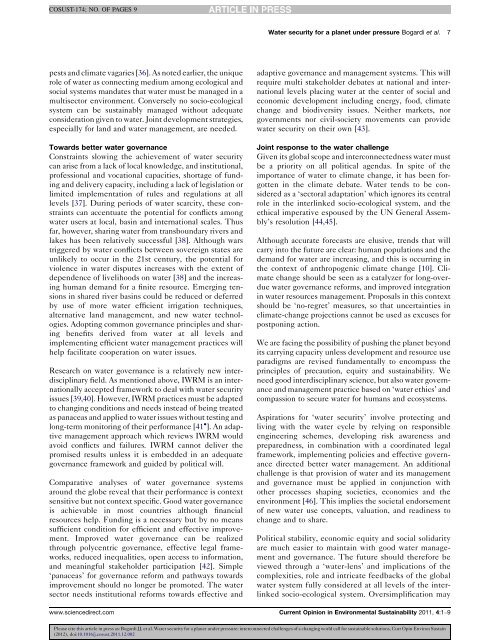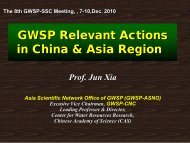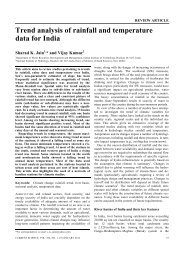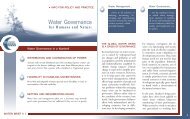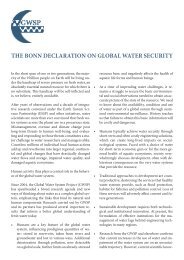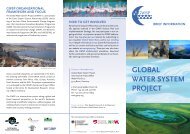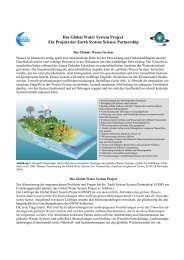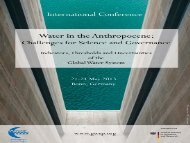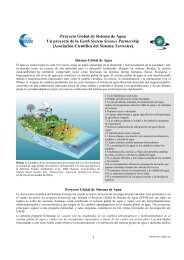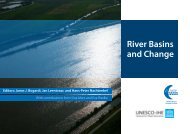Water security for a planet under pressure: interconnected ... - GWSP
Water security for a planet under pressure: interconnected ... - GWSP
Water security for a planet under pressure: interconnected ... - GWSP
Create successful ePaper yourself
Turn your PDF publications into a flip-book with our unique Google optimized e-Paper software.
COSUST-174; NO. OF PAGES 9<br />
<strong>Water</strong> <strong>security</strong> <strong>for</strong> a <strong>planet</strong> <strong>under</strong> <strong>pressure</strong> Bogardi et al. 7<br />
pests and climate vagaries [36]. As noted earlier, the unique<br />
role of water as connecting medium among ecological and<br />
social systems mandates that water must be managed in a<br />
multisector environment. Conversely no socio-ecological<br />
system can be sustainably managed without adequate<br />
consideration given to water. Joint development strategies,<br />
especially <strong>for</strong> land and water management, are needed.<br />
Towards better water governance<br />
Constraints slowing the achievement of water <strong>security</strong><br />
can arise from a lack of local knowledge, and institutional,<br />
professional and vocational capacities, shortage of funding<br />
and delivery capacity, including a lack of legislation or<br />
limited implementation of rules and regulations at all<br />
levels [37]. During periods of water scarcity, these constraints<br />
can accentuate the potential <strong>for</strong> conflicts among<br />
water users at local, basin and international scales. Thus<br />
far, however, sharing water from transboundary rivers and<br />
lakes has been relatively successful [38]. Although wars<br />
triggered by water conflicts between sovereign states are<br />
unlikely to occur in the 21st century, the potential <strong>for</strong><br />
violence in water disputes increases with the extent of<br />
dependence of livelihoods on water [38] and the increasing<br />
human demand <strong>for</strong> a finite resource. Emerging tensions<br />
in shared river basins could be reduced or deferred<br />
by use of more water efficient irrigation techniques,<br />
alternative land management, and new water technologies.<br />
Adopting common governance principles and sharing<br />
benefits derived from water at all levels and<br />
implementing efficient water management practices will<br />
help facilitate cooperation on water issues.<br />
Research on water governance is a relatively new interdisciplinary<br />
field. As mentioned above, IWRM is an internationally<br />
accepted framework to deal with water <strong>security</strong><br />
issues [39,40]. However, IWRM practices must be adapted<br />
to changing conditions and needs instead of being treated<br />
as panaceas and applied to water issues without testing and<br />
long-term monitoring of their per<strong>for</strong>mance [41 ]. An adaptive<br />
management approach which reviews IWRM would<br />
avoid conflicts and failures. IWRM cannot deliver the<br />
promised results unless it is embedded in an adequate<br />
governance framework and guided by political will.<br />
Comparative analyses of water governance systems<br />
around the globe reveal that their per<strong>for</strong>mance is context<br />
sensitive but not context specific. Good water governance<br />
is achievable in most countries although financial<br />
resources help. Funding is a necessary but by no means<br />
sufficient condition <strong>for</strong> efficient and effective improvement.<br />
Improved water governance can be realized<br />
through polycentric governance, effective legal frameworks,<br />
reduced inequalities, open access to in<strong>for</strong>mation,<br />
and meaningful stakeholder participation [42]. Simple<br />
‘panaceas’ <strong>for</strong> governance re<strong>for</strong>m and pathways towards<br />
improvement should no longer be promoted. The water<br />
sector needs institutional re<strong>for</strong>ms towards effective and<br />
adaptive governance and management systems. This will<br />
require multi stakeholder debates at national and international<br />
levels placing water at the center of social and<br />
economic development including energy, food, climate<br />
change and biodiversity issues. Neither markets, nor<br />
governments nor civil-society movements can provide<br />
water <strong>security</strong> on their own [43].<br />
Joint response to the water challenge<br />
Given its global scope and <strong>interconnected</strong>ness water must<br />
be a priority on all political agendas. In spite of the<br />
importance of water to climate change, it has been <strong>for</strong>gotten<br />
in the climate debate. <strong>Water</strong> tends to be considered<br />
as a ‘sectoral adaptation’ which ignores its central<br />
role in the interlinked socio-ecological system, and the<br />
ethical imperative espoused by the UN General Assembly’s<br />
resolution [44,45].<br />
Although accurate <strong>for</strong>ecasts are elusive, trends that will<br />
carry into the future are clear: human populations and the<br />
demand <strong>for</strong> water are increasing, and this is occurring in<br />
the context of anthropogenic climate change [10]. Climate<br />
change should be seen as a catalyzer <strong>for</strong> long-overdue<br />
water governance re<strong>for</strong>ms, and improved integration<br />
in water resources management. Proposals in this context<br />
should be ‘no-regret’ measures, so that uncertainties in<br />
climate-change projections cannot be used as excuses <strong>for</strong><br />
postponing action.<br />
We are facing the possibility of pushing the <strong>planet</strong> beyond<br />
its carrying capacity unless development and resource use<br />
paradigms are revised fundamentally to encompass the<br />
principles of precaution, equity and sustainability. We<br />
need good interdisciplinary science, but also water governance<br />
and management practice based on ‘water ethics’ and<br />
compassion to secure water <strong>for</strong> humans and ecosystems.<br />
Aspirations <strong>for</strong> ‘water <strong>security</strong>’ involve protecting and<br />
living with the water cycle by relying on responsible<br />
engineering schemes, developing risk awareness and<br />
preparedness, in combination with a coordinated legal<br />
framework, implementing policies and effective governance<br />
directed better water management. An additional<br />
challenge is that provision of water and its management<br />
and governance must be applied in conjunction with<br />
other processes shaping societies, economies and the<br />
environment [46]. This implies the societal endorsement<br />
of new water use concepts, valuation, and readiness to<br />
change and to share.<br />
Political stability, economic equity and social solidarity<br />
are much easier to maintain with good water management<br />
and governance. The future should there<strong>for</strong>e be<br />
viewed through a ‘water-lens’ and implications of the<br />
complexities, role and intricate feedbacks of the global<br />
water system fully considered at all levels of the interlinked<br />
socio-ecological system. Oversimplification may<br />
www.sciencedirect.com Current Opinion in Environmental Sustainability 2011, 4:1–9<br />
Please cite this article in press as: Bogardi JJ, et al. <strong>Water</strong> <strong>security</strong> <strong>for</strong> a <strong>planet</strong> <strong>under</strong> <strong>pressure</strong>: <strong>interconnected</strong> challenges of a changing world call <strong>for</strong> sustainable solutions, Curr Opin Environ Sustain<br />
(2012), doi:10.1016/j.cosust.2011.12.002


